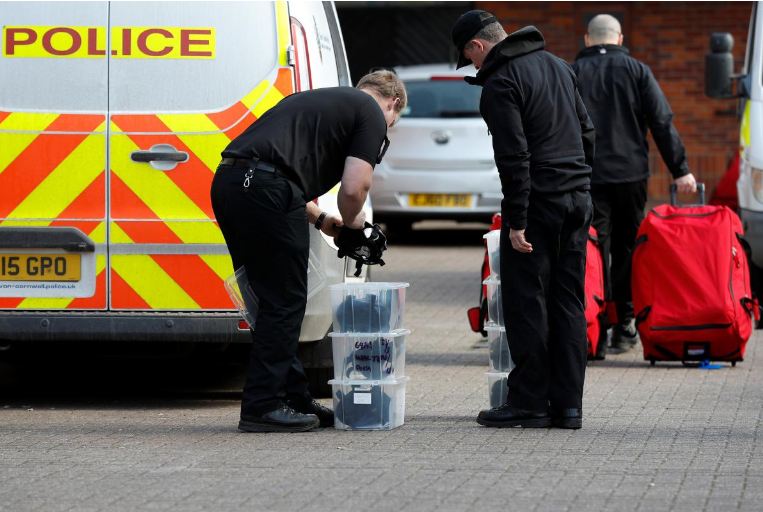Britain seeks European help against Russian spy networks

Britain’s Prime Minister Theresa May will urge joint action among European Union states at a summit in Brussels on Thursday, where she will also try to persuade the bloc’s leaders to condemn Russia squarely over the attack in Salisbury.
“Russia staged a brazen and reckless attack against the United Kingdom,” May told reporters on arriving at the summit.
“It’s clear that the Russian threat does not respect borders and indeed the incident in Salisbury was a pattern of Russian aggression against Europe and its near neighbors.”
May accused Russia of the first known offensive use of a nerve toxin in Europe since World War Two after Sergei Skripal, a former Russian double agent, and his daughter were found unconscious on a public bench in the English city on March 4.
In the worst crisis between the two powers since the Cold War, May has expelled 23 Russian diplomats whom she says were spies working under cover. Moscow, which has denied involvement in the attack, has taken retaliatory steps.
Lithuanian President Dalia Grybauskaite said she was already considering expelling Russian spies from her territory.
“Britain says there are these networks that organize such things like Salisbury, that these networks exist across our borders and that it would be good to go after them together,” a senior EU diplomat said. “They have been approaching EU states on that bilaterally and today May will tell EU leaders more.”
Diplomats stressed May was not seeking a formal or immediate EU strategy because the bloc has little joint competence on intelligence, meaning any such work would be done directly with other governments.
“There is movement among several willing states to do something together in reaction to Skripal,” said another EU diplomat, adding that this would be done bilaterally outside the EU so as not to press too hard those members of the bloc who are more worried about their ties with Moscow.
Reluctance from countries - Greece and Hungary among them - means a draft joint statement by EU leaders now says only that they take “extremely seriously” London’s assessment that it was highly likely Russia was responsible for the attack.
But May will push fellow EU leaders to blame Moscow directly for the poisoning of the Skripals who British authorities say have been critically ill since the attack by a Soviet-produced military-grade nerve agent called Novichok.
Russia’s ambassador to London on Thursday said that, had Novichok been used, the Skripals would have died.
European Council President Donald Tusk, who will chair the summit and has sided with Britain, said: “It is clear we should improve our preparedness for future attacks.”
He wants the bloc to discuss how to better protect itself from chemical and biological attacks, including in cooperation with NATO, as well as to how to beef up counter-intelligence capabilities to combat hybrid threats.
PROOF
A British official confirmed London was seeking to work with groups of countries on intelligence-sharing over spy networks.
“Russia has shown itself as a strategic enemy, not a strategic partner,” said another British official, who stressed however that Britain was not seeking new economic sanctions.
May will seek to demonstrate to EU governments that all Western countries are vulnerable to such attacks, as well as what NATO says is a Russian strategy to undermine the West, officials said.
She will need to overcome reluctance from the Russia doves in the EU since the bloc is traditionally split on how to deal with Moscow.
Ties between Moscow and the West plummeted over Moscow’s 2014 annexation of Crimea from Kiev and support for rebels in east Ukraine, which have triggered sanctions by the EU.
French President Emmanuel Macron said on Wednesday the Salisbury attack could not go without response.
Macron, German Chancellor Angela Merkel and U.S. President Donald Trump have already said in a joint statement with May that they “share” Britain’s assessment of Russian responsibility.
Diplomats said EU leaders could settle for similar language, though some bloc members remained concerned there was not enough direct proof to incriminate Russia in the attack.







